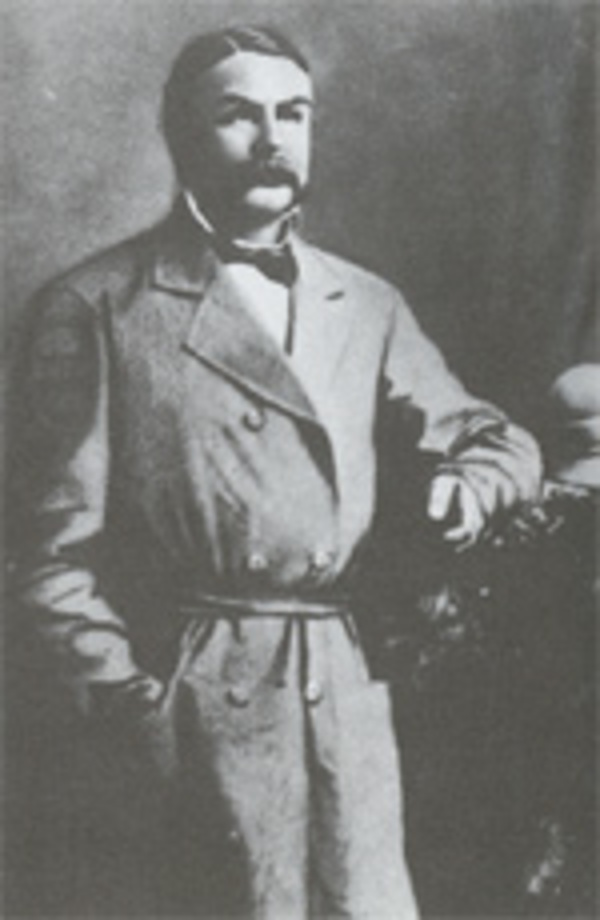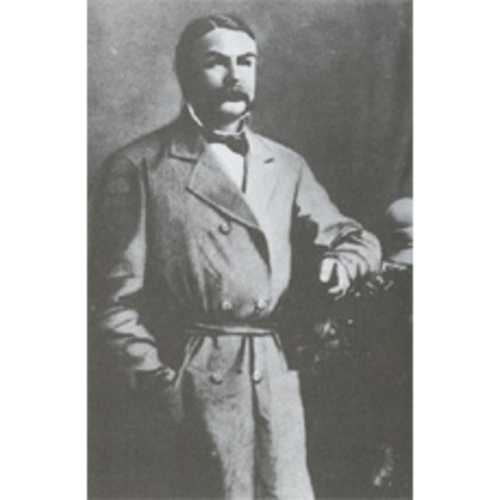
Source: Courtesy of Wikimedia Commons
SPROAT, GILBERT MALCOLM, businessman, government agent, Indian reserve commissioner, magistrate, and author; b. 19 April 1834 at Brighouse Farm, near Borgue, Kirkcudbrightshire, Scotland, son of Alexander Sproat, a farmer, and Hectorine Shaw; m. 23 Dec. 1862 Katherine Ann (Anne) Wigham in Victoria, and they had a daughter and two sons; d. there 4 June 1913.
Gilbert Malcolm Sproat was born into a large family of limited means, and was educated at the Borgue Grammar School and Haddon Hall, Dumfries. Although he studied for the Indian civil service, in 1860 he went instead to Vancouver Island as an employee of Anderson and Company, which intended to establish a sawmill on the Alberni Canal (Alberni Inlet). He arrived in Victoria in April, complete with the necessary men and equipment, and a letter of introduction to Governor James Douglas*. He was made Anderson and Company’s local manager in 1863, succeeding Edward Stamp*. Sproat declined Douglas’s offer of a seat in the colony’s legislative council, but on 24 July 1863 he was sworn in as a justice of the peace for Vancouver Island. He then became in effect the government agent for the west coast of the island.
The destruction of the sawmill by fire was the occasion for the winding-up of the Alberni enterprise in 1865. Sproat returned to England. However, his stay had set the pattern for the rest of his life. Not only had he gained business and government experience, but he had observed at first hand the collision of colonist and Indian when he was obliged to establish his mill on aboriginal land. The encounter led to his best-known book, Scenes and studies of savage life, published in 1868. An examination of the Aht of Vancouver Island’s west coast with an extensive vocabulary of the language, which he had learned, it was by the standards of the day an informed, thoughtful, and sympathetic account of these people, whom James Cook* had called Nootka. Sproat also contributed papers to the Ethnological Society of London.
In England he organized the “London Committee for watching the affairs of British Columbia,” and when Vancouver Island and mainland British Columbia were merged in 1866, this committee attempted, unsuccessfully, to have the representative institutions of the island conferred on the new colony. The experience convinced Sproat that England was and would remain woefully ignorant of British Columbia’s affairs, and that information and lobbying were critically important if the Colonial Office were to be made to adopt what he viewed as proper policies. Throughout this period he remained actively interested in British Columbia. He even allowed his name to stand for appointment as governor in 1869.
After a brief visit to British Columbia when it joined confederation in 1871, Sproat transformed himself into the province’s first agent general to London, providing unflagging service as an emigration adviser and publicist and producing, among other things, an emigrant’s handbook in 1873. But it was not until he returned to British Columbia, probably in 1876, that he had his most significant impact. The province and the dominion, in an effort to resolve their confrontation over aboriginal title and reserves, had agreed to set up an Indian reserve commission that would allot lands to the various aboriginal nations. Early in 1876 each government appointed one representative, Alexander Caulfield Anderson* for the dominion and Archibald McKinlay for the province; Sproat was to be the joint appointee.
The early signs, however, were not good. The province was slow to approve the selection of the joint commissioner and took the position that, because Indian affairs were exclusively within federal jurisdiction, British Columbia should not have to contribute to the commission’s costs. It eventually relented, but negotiations over just how much Victoria should pay took so long that the commissioners’ work got off to a late and inauspicious start in the fall of 1876. Then, when the expense accounts began to come in during 1877, the province complained again. To save money Sproat carried on as the sole working commissioner from 1878 to 1880.
Although committed to the eventual and inevitable displacement of the aboriginal inhabitants, Sproat was much more sensitive than his contemporaries were to the moral and legal ambiguities that the process involved. Indeed, he was surprised at how little settlers who lived virtually next door to Indians knew about their neighbours, although their ignorance did not stop most of them from believing that Indians had no rights. Sproat, on the other hand, was an admirer of Douglas, and was just as determined as he had been to ensure that enough good land was set aside for the Indians to support themselves. This determination led to protests in the local press and in parliament about the liberality of his allotments. In one notorious case, Sproat accused Cornelius O’Keefe of illegally attempting to pre-empt land that he knew was subject to a long-standing Indian claim. When the provincial government appeared to take O’Keefe’s side, Sproat threatened to convert what was a dispute about a reserve allotment into one about aboriginal title to the soil, an issue the dominion had undertaken not to raise if the province agreed to, and cooperated with, the commission.
During his approximately three and a half years with the commission, Sproat’s sympathy for the Indians increased as he became more familiar with how the provincial government dealt with them. By 1879 he had concluded that the province would never recognize Indian land rights and would do its best to keep the reserves to an absolute minimum. He also had to deal with some legal obstacles that the government of Premier George Anthony Walkem* placed in the way of reserve allocation, and bringing up Indian matters with the premier “was like calling his attention to the presence of a rattlesnake,” as one official remarked. Because provincial governments at the time were unstable and depended heavily on the votes of settlers, Sproat’s position soon became untenable. He attracted further public criticism for encouraging what might today be called self-government initiatives on the part of the Thompson River Indians of the interior, and he resigned in 1880, telling the dominion government that he could not bring himself to be the instrument of communicating Ottawa’s disapproval to the Indians. Sproat’s successor as sole reserve commissioner was Joseph William Trutch*’s brother-in-law, Peter O’Reilly* – a man who was perhaps more in tune with the provincial view of reserve land policy.
In 1883 Sproat travelled for the first time to the Kootenays, once again as a government agent, but with instructions to make a report on the territory. This assignment led to a long-standing connection with the region, especially after he became the stipendiary magistrate at Farwell (Revelstoke) in 1885, and both gold and land commissioner for the region in 1886. He may lay claim to have founded a number of towns, including Revelstoke and New Denver, and he came to be known locally as “the Judge” and “the Father of the Kootenay.” He left government service in 1889 but remained in the interior for a number of years, buying and selling real estate.
When Sproat returned to Victoria in 1898 he devoted most of his time to research and writing, and to correcting those who, in his view, publicly misrepresented the early history of British Columbia. He contributed letters to the editor, even wrote some editorials, and both wrote and edited material for publication in daily and weekly newspapers. He also completed significant portions of a history of the British colonies in the North Pacific, only parts of which survive. Even without it, his publication record is more than worthy of the sort of self-educated Victorian that he was. As former premier Amor De Cosmos* is supposed to have said, Sproat was a “man who has forgotten more in one day, than most of us could learn in a lifetime.”
Sproat developed heart trouble towards the end of his life. Separated from his wife, who had elected to stay in England, he spent his last days in the home of Miss Brenda Peers, a granddaughter of James Murray Yale*, formerly a chief trader with the Hudson’s Bay Company. According to her, Sproat “was of a kindly and agreeable nature with a good deal of quiet humour. Refined and gentlemanly always but stern when required.” Sproat Lake, near the head of Alberni Inlet, is named for him.
A new edition of Gilbert Malcolm Sproat’s Scenes and studies of savage life prepared by Charles Lillard appeared at Victoria in 1987 under the title The Nootka: scenes and studies of savage life. Sproat himself was the editor of the reminiscences of John Tod*, “Career of a Scotch boy who became Hon. John Tod: an unfashionable true story,” published in the Victoria Daily Times, 30 Sept.–23 Dec. 1905 (later reissued as “Career of a Scotch boy,” ed. Madge Wolfenden, in British Columbia Hist. Quarterly (Victoria), 18 (1954): 133–238), and he was the author of “Sir James Douglas, k.c.b.,” in the Victoria Week, 9 Sept.–11 Nov. 1911 (also preserved in clippings at pp.96–103 of the J. T. Walbran scrapbook at BCARS, S/S/W 14).
Some 40 reports and memoranda by or concerning Sproat appear in the Indian affairs records in NA, RG 10, 3611–12, 3617, 3637, 3645–47, 3650, 3653, 3656–57, 3663, 3666–68, 3670, 3698–700, 3707, 3711–12, 3716, and 7537 (mfm. at BCARS). Additional writings by him are found in the Sproat papers at BCARS, Add. mss 257, and in two other collections there, Add. mss 354, and G/N32/C69: 39–49.
BCARS, GR 494; W/Sp8S. B.C., Papers connected with the Indian land question, 1850–1875 (Victoria, 1875; repr. 1987 with supp., “Papers connected with the Indian land question, 1877”); Legislative Assembly, Sessional papers, 1878: 499–505; 1884: 309–23; 1885: 391–402. Robin Fisher, “An exercise in futility: the joint commission on Indian land in British Columbia, 1875–1880,” CHA, Hist. papers, 1975: 79–94. T. A. Rickard, “Gilbert Malcolm Sproat,” British Columbia Hist. Quarterly, 1 (1937): 21–32.
Cite This Article
Hamar Foster, “SPROAT, GILBERT MALCOLM,” in Dictionary of Canadian Biography, vol. 14, University of Toronto/Université Laval, 2003–, accessed February 20, 2026, https://www.biographi.ca/en/bio/sproat_gilbert_malcolm_14E.html.
The citation above shows the format for footnotes and endnotes according to the Chicago manual of style (16th edition). Information to be used in other citation formats:
| Permalink: | https://www.biographi.ca/en/bio/sproat_gilbert_malcolm_14E.html |
| Author of Article: | Hamar Foster |
| Title of Article: | SPROAT, GILBERT MALCOLM |
| Publication Name: | Dictionary of Canadian Biography, vol. 14 |
| Publisher: | University of Toronto/Université Laval |
| Year of publication: | 1998 |
| Year of revision: | 1998 |
| Access Date: | February 20, 2026 |



